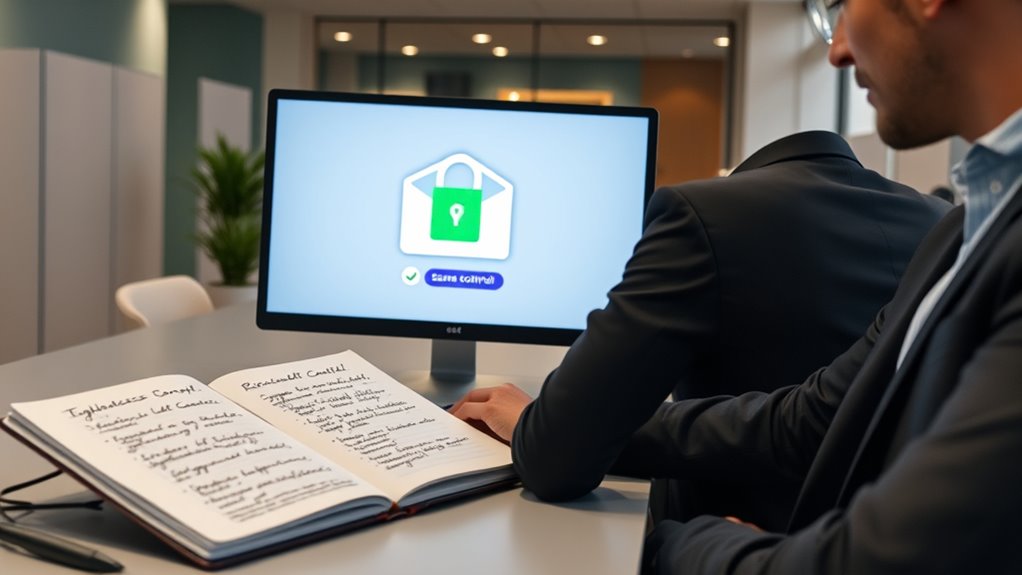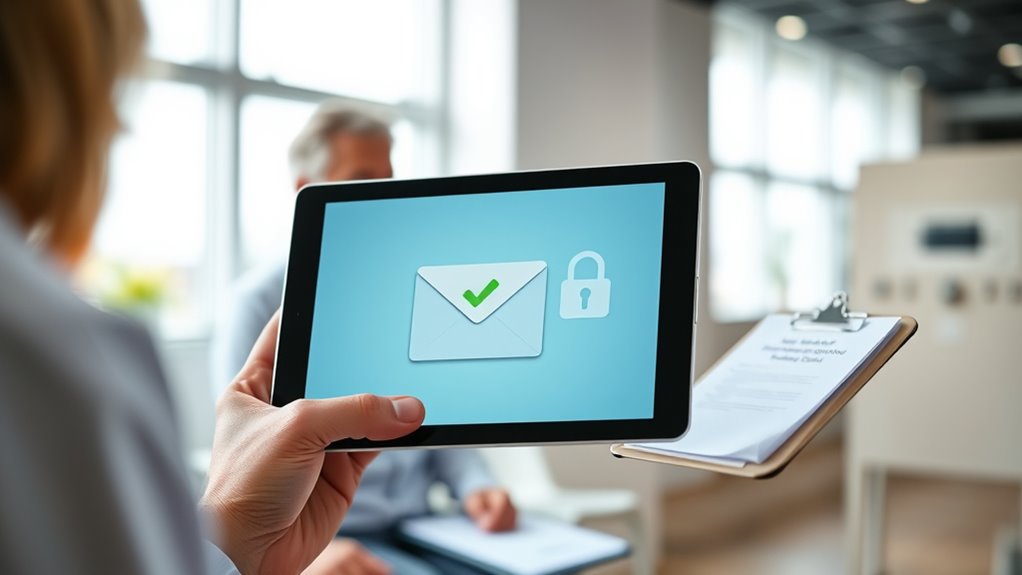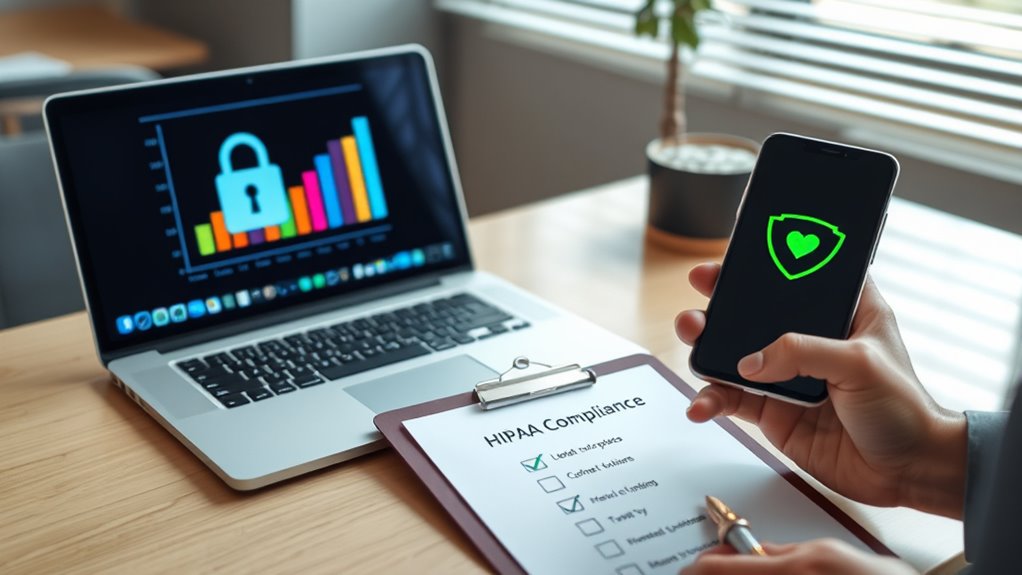To guarantee HIPAA compliance in your email communication, you should use secure, encrypted platforms that support data protection and restrict access to authorized staff. Always verify recipient identities, avoid sharing sensitive details in subject lines, and obtain patient consent before sharing protected health information. Regular staff training on proper email etiquette and monitoring practices are key. Maintaining clear policies and continuously updating security measures help build trust while safeguarding patient info—keep exploring further to master these tactics.
Key Takeaways
- Use secure, HIPAA-compliant email platforms with encryption and access controls.
- Educate staff on proper email etiquette, including avoiding sensitive details in subject lines.
- Obtain patient consent before sharing protected health information via email.
- Regularly audit email practices and monitor for vulnerabilities to ensure ongoing compliance.
- Develop clear policies emphasizing secure messaging, patient privacy, and staff training.
Understanding HIPAA Requirements for Email Communication

Understanding HIPAA requirements for email communication is essential to protecting patient privacy and ensuring compliance. You need to follow proper email etiquette to avoid accidental disclosures, such as using secure language and avoiding sensitive details in subject lines. Always verify recipient identities before sending patient information and limit the amount of data shared via email. Maintaining clear communication helps foster patient engagement while respecting their privacy rights. You should also avoid using personal email accounts for transmitting protected health information (PHI). Instead, use approved, secure channels that meet HIPAA standards. Leveraging digital platforms designed for healthcare communication can further enhance security and compliance. By adhering to these guidelines, you minimize risks of breaches and demonstrate your commitment to confidentiality, building trust and encouraging ongoing patient engagement in their care process.
Choosing Secure Email Platforms for Healthcare Settings

When selecting a secure email platform for healthcare, you need to focus on key features like robust encryption and data protection. These tools guarantee patient information stays confidential and compliant with regulations. By prioritizing these aspects, you can confidently communicate sensitive data without risking breaches. Ensuring the platform supports HIPAA compliance is essential for meeting legal requirements and safeguarding patient privacy.
Secure Platform Features
Choosing a secure email platform for healthcare settings requires careful attention to its core features, as these directly impact patient privacy and data protection. Key features include reliable email archiving, which ensures records are stored securely and accessible for compliance audits. You should also prioritize user-friendly interfaces to promote staff training, enabling your team to handle sensitive information confidently. Additionally, look for robust access controls and activity monitoring to detect unauthorized activity. Here’s a quick overview:
| Feature | Benefit | Consideration |
|---|---|---|
| Email Archiving | Ensures compliance, easy retrieval | Storage capacity and retention policies |
| Staff Training | Reduces human error, boosts security | Ongoing education programs |
| Access Controls | Limits data access, enhances security | Customizable permissions |
Implementing these features aligns with the growing importance of data privacy challenges in healthcare, helping to safeguard sensitive patient information.
Encryption and Data Protection
Ensuring encryption and data protection is essential when selecting a secure email platform for healthcare settings, as these features safeguard sensitive patient information from unauthorized access. Look for platforms that offer secure messaging, which encrypts data end-to-end, preventing interception during transmission. Strong email authentication methods, like multi-factor authentication and digital signatures, verify user identities and prevent impersonation. These security measures guarantee only authorized personnel access protected health information (PHI). Additionally, confirm the platform complies with HIPAA standards, reinforcing your commitment to data privacy. By prioritizing encryption and robust authentication, you minimize risks of data breaches and maintain trust with your patients, while ensuring your healthcare organization stays compliant with privacy regulations. Incorporating Self Watering Plant Pots into your facility’s environmental design can also contribute to a healthier, more sustainable setting that supports patient well-being.
Implementing Encryption and Access Controls

To safeguard patient information, you need to encrypt sensitive data both in transit and at rest. Limiting email access ensures only authorized personnel can view confidential information. Implementing these controls is essential for maintaining compliance and safeguarding patient trust.
Encrypt Sensitive Data
How can healthcare organizations protect sensitive data from unauthorized access? The key is implementing strong encryption methods and access controls. Start by using email encryption to secure messages containing protected health information (PHI). Encryption transforms data into an unreadable format, ensuring that only authorized recipients can decrypt and view it. Additionally, establish strict access controls, limiting who can view or handle sensitive data. This prevents unauthorized personnel from gaining access, maintaining data privacy. Regularly update encryption protocols to stay ahead of cyber threats and ensure compliance with HIPAA regulations. Implementing multi-factor authentication adds an extra layer of security for accessing sensitive data. By encrypting sensitive data and controlling access, you safeguard patient information, reduce the risk of data breaches, and demonstrate your commitment to maintaining the confidentiality and integrity of healthcare data.
Limit Email Access
Have you considered how limiting email access can considerably enhance your healthcare organization’s security? By implementing strict access restrictions, you prevent unauthorized staff from viewing sensitive patient information. Use email filtering tools to automatically block or flag suspicious messages before they reach inboxes. Make certain only essential personnel have access to confidential data, reducing the risk of accidental leaks or breaches. Establish clear policies that specify who can access email accounts containing protected health information (PHI), and regularly review these permissions. Combining access restrictions with encryption further safeguards your data during transmission and storage. Remember, limiting email access isn’t just about technology—it’s about creating a culture of security awareness and accountability across your organization. Regularly updating your access controls is also crucial to adapt to evolving security threats and maintain compliance.
Establishing Clear Email Policies and Staff Training

Establishing clear email policies is essential for maintaining healthcare compliance and protecting sensitive patient information. You need to set guidelines that emphasize proper email etiquette, including secure messaging, appropriate language, and avoiding sharing unnecessary details. Clear policies help staff understand their responsibilities and ensure consistent practices across your organization. Training is equally important; you should educate staff on HIPAA requirements, confidentiality, and the importance of safeguarding protected health information (PHI). When staff know the rules and understand the significance of their actions, accountability improves. Regular training sessions and updates reinforce these standards, making compliance second nature. This proactive approach minimizes risks and fosters a culture of security, ensuring your team handles emails responsibly and ethically. Implementing employee training programs further enhances understanding and adherence to these policies.
Managing Patient Consent and Information Sharing

Effective management of patient consent is crucial for ensuring legal compliance and respecting patient autonomy. You should prioritize clear patient education to guarantee individuals understand how their information will be shared and stored. Use straightforward language to explain the purpose of data collection and sharing practices. Always obtain signed consent forms before sharing any protected health information via email, and keep these forms organized for easy access. Make sure patients are aware they can revoke consent at any time, and document their preferences carefully. Regularly review and update consent procedures to reflect changes in regulations or practice. By actively managing patient consent and emphasizing education, you foster trust, ensure compliance, and protect both your practice and your patients’ rights. Incorporating self-awareness into patient interactions can further enhance understanding and cooperation.
Regular Audits and Monitoring for Compliance

Regular audits and ongoing monitoring are essential to maintaining healthcare compliance and identifying potential issues before they escalate. By consistently reviewing your email practices, you strengthen your risk management strategies and guarantee adherence to HIPAA regulations. Regular audits help you spot vulnerabilities in data handling, privacy controls, and security protocols, allowing you to address problems proactively. Monitoring also keeps you on top of compliance reporting requirements, making it easier to document your efforts and demonstrate compliance during inspections. Implementing systematic audits fosters a culture of accountability and continuous improvement. Staying vigilant with these practices not only reduces the risk of breaches but also builds trust with patients and regulators, ensuring your organization remains compliant and secure in handling sensitive health information. Incorporating vendor reliability assessments into your monitoring processes further enhances your ability to manage potential security vulnerabilities effectively.
Frequently Asked Questions
How Often Should Healthcare Providers Review Their Email Security Protocols?
You should review your email security protocols at least quarterly to stay ahead of email phishing threats. Regular reviews help identify vulnerabilities and guarantee your staff’s training stays current. Since cyber threats evolve rapidly, frequent updates are essential. Conduct staff training alongside these reviews to reinforce best practices. This proactive approach minimizes risks, maintains compliance, and keeps sensitive patient information secure in your email communications.
What Are the Consequences of Non-Compliance With HIPAA Email Regulations?
Imagine your email system as a vault protecting patient secrets. If you ignore HIPAA email regulations, you risk severe legal penalties, like hefty fines or lawsuits, and compromise patient confidentiality. I once heard about a clinic fined over $1 million for a breach. Non-compliance puts your practice at legal and reputational risk, making it essential to follow HIPAA rules to safeguard sensitive information and avoid costly consequences.
How Can Small Practices Afford Hipaa-Compliant Email Solutions?
You might wonder how small practices can afford HIPAA-compliant email solutions. Luckily, there are affordable solutions and cost-effective options tailored for small practices. You can explore cloud-based email services with built-in security features or subscribe to specialized HIPAA-compliant email providers that offer flexible plans. By comparing providers and focusing on essential security features, you can find a solution that fits your budget while keeping patient data protected.
Are There Specific Email Encryption Standards Mandated by HIPAA?
HIPAA doesn’t mandate specific email encryption standards, but it requires you to protect email confidentiality and data integrity. You should use strong email encryption methods like TLS or end-to-end encryption to secure sensitive information. Ensuring data integrity means verifying that messages aren’t altered during transmission. By adopting these encryption practices, you can meet HIPAA’s requirements and safeguard your patients’ private health information effectively.
How to Handle Email Breaches or Data Leaks Effectively?
When handling email breaches or data leaks, you should act quickly by notifying affected parties and your IT team. Conduct phishing awareness and staff training to prevent future incidents. Review your security protocols, identify how the breach occurred, and implement stronger encryption or access controls. Regularly update your security measures, maintain detailed incident documentation, and guarantee compliance with HIPAA regulations to protect sensitive information effectively.
Conclusion
By following these HIPAA-friendly email tactics, you not only protect patient data but also avoid costly compliance surprises. When your secure email practices align with regulations, you might find that a simple, overlooked detail—like a password reset—can make all the difference. Stay vigilant, keep policies clear, and regularly audit your systems. In healthcare, safeguarding information isn’t just routine; it’s a key to building trust that could unexpectedly save you from future headaches.









